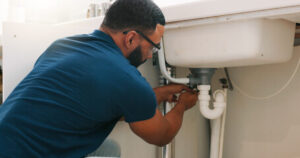Plumbers Bradenton do much more than unclog toilets or repair sinks. They design piping systems that disperse water, remove waste, and connect heating and cooling systems.

They also work closely with architects and construction teams to ensure that plumbing systems are integrated seamlessly into building projects and meet all required standards and regulations. And they are always on call to respond to emergencies like burst pipes and clogged drains.
Choosing to become a plumber is an excellent career choice for individuals who enjoy working with their hands and solving problems. Plumbers work in a wide range of settings, including homes, businesses, and industrial buildings. They install, repair, and maintain plumbing systems that include water supply lines, drains, and waste removal systems. They also inspect and test systems to ensure that they are functioning properly. Plumbers must be comfortable working with tools, in tight spaces, and around hazardous materials. They must be able to follow strict safety protocols when handling chemicals and operating power equipment.
Plumbers are often hired by construction companies to manage and supervise the installation of plumbing systems for new building projects. They must be able to read blueprints and understand the specifications for each project. They may also need to perform inspections and testing of existing plumbing systems. These tests may include checking for leaks, signs of corrosion, and proper venting of gas lines. Plumbers may also be responsible for submitting reports and obtaining permits.
Residential plumbers focus on the plumbing needs of homes and apartments. They install and repair fixtures like bathtubs, showers, sinks, and toilets. They also inspect the water and sewage systems for clogs, breaks, and other problems. These plumbers also handle routine maintenance, such as cleaning drains and replacing worn-out parts.
Commercial plumbers work in a wide variety of commercial and industrial settings, including offices, retail stores, restaurants, hospitals, and power plants. They install and repair complex plumbing systems that serve multiple occupants, such as water supply lines, fire sprinkler systems, and large water heaters. In these roles, plumbers must be able to coordinate with facility managers and other contractors.
Service and repair plumbers are the front-line staff for plumbing services. They respond to calls from customers and perform repairs on site. They must be able to diagnose and fix problems quickly and efficiently. In addition to their technical skills, service and repair plumbers must be personable and able to communicate effectively with customers. They are also responsible for ensuring that their own work meets industry standards and customer expectations.
Education and training requirements
Plumbers install, repair, and maintain water, gas, and drainage systems. They work in homes, commercial buildings, and factories. They also install and repair plumbing fixtures such as bathtubs, toilets, and sinks. They may also work on appliances such as dishwashers and water heaters. They can even be found repairing septic systemsthe large underground tanks that collect waste from houses not connected to sewer systems.
To become a plumber, you need to complete a training program and earn a license. There are several options available for plumber training, including vocational programs and apprenticeships. Many vocational programs are offered at local colleges and trade schools. These programs typically combine classroom education with practical hands-on experience. They also teach skills like pipe system design, safety, and tool use. Some programs even offer welding courses, which are required by some pipefitter and steamfitter apprenticeship training programs.
Apprenticeships last four to five years and combine classroom instruction with on-the-job training. Most states require that plumbers be licensed. The steps to becoming a licensed plumber vary by state, but the process is usually similar. Applicants must first obtain a high school diploma or GED certificate. They then need to complete a vocational program at a trade school or community college. Many plumbers choose to join a union, which provides additional training opportunities and job security.
After completing the program, a candidate must pass an exam to become a licensed journeyman plumber. The exam is typically based on the National Board of Plumbing Examinations. The National Board of Plumbing Examinations is an independent organization that sets standards and exams for the plumbing industry. Plumbers who want to become master plumbers must pass a more comprehensive exam, which covers advanced plumbing practices and business management.
Some states do not have licensing requirements for plumbers, but most have a progression of apprenticeship, journeyman, and master levels that require specific qualifications. For example, New York requires all plumbers to hold a license and submit a surety bond before they can work. In addition, the state requires that plumbers renew their license every year.
Work environment
Plumbers work in a variety of settings, from residential to commercial and industrial. They perform many different tasks, including installing and repairing fixtures, addressing leaks, and ensuring that all systems are functioning properly. They also use a wide range of tools and equipment to perform their job duties. Some plumbers specialize in specific areas, such as repairing water heaters or toilets. Others may choose to focus on the installation of septic systems and other sewage systems. Plumbers often travel to different sites and work long hours, including nights and weekends.
In addition to the physical demands of this career, plumbers must be able to work under pressure and adhere to strict safety standards. This can be challenging, especially in emergency situations, when plumbers must work quickly to address urgent problems. However, these challenges can be rewarding when they are overcome.
Plumbing is a highly-skilled profession that requires extensive training and hands-on experience. Aspiring plumbers should consider taking a vocational course, such as a Certificate III in Plumbing, to gain the skills and knowledge necessary for success. This program is designed to provide a fast track into the industry and offers hands-on learning opportunities.
Plumbers must be able to work in tight spaces and awkward positions, and they often need to lift heavy objects. They also need to be comfortable working in chilly or hot weather conditions. Many plumbers are self-employed, so they must manage their own schedules and be on-call for emergencies.
Plumbers typically work with other professionals, such as builders and architects, to ensure that all plumbing systems are installed correctly in new construction or renovation projects. They must be knowledgeable about local building codes and regulations to guarantee the safety and functionality of plumbing systems. Plumbers must also be able to communicate effectively with customers and other tradespeople.
Plumbing is a demanding but rewarding career, and it’s a great choice for those who are interested in a challenging and varied work environment. There are many career paths in the plumbing industry, from apprenticeships to self-employment. Those who are passionate about the industry can also opt for further education or professional development programs to keep up with advances in technology and equipment.
Salary
A plumber’s salary varies by location, experience, and work type. Beginners start with an average of $40,000; seasoned plumbers can earn up to $100,000. Some of the highest-paid plumbers are union members and those who specialize in green plumbing or HVAC. The Bureau of Labor Statistics provides wage estimates for different regions and skill levels.
To begin a career as a plumber, students can enroll in a plumbing trade school or an apprenticeship program. These programs provide a combination of classroom instruction and hands-on training. They teach students about plumbing systems, soldering techniques, water backflow prevention, and blueprint reading. In addition, they help students develop job skills and become licensed. Typically, these programs last for 4-5 years and are a great way to get started in the field.
Plumbers are construction specialists who repair and install several types of pipes that carry gas and water to a building or home. They also install fixtures that take waste away from industries and individual homes. Some of these fixtures include toilets, sinks, bathtubs, and showers. Plumbers are a skilled trade that can offer stable demand and lucrative pay.
A career in plumbing is a good choice for those who enjoy the challenge of solving problems. They must be able to think critically and solve complex issues. They must also be able to handle pressure and tight spaces. Some of the best plumbers are able to perform work under tight deadlines.
The national average salary for plumbers is $60,090, but this number can vary significantly by region. In cities like San Francisco, they can earn $82,000 or more per year. However, in the rural Midwest, salaries are lower. This may be because of the lower cost of living and low demand for skilled trades workers.
In 2022, the occupation had a wage GINI coefficient of 0.33, which is less than the national average of 0.478. This means that wages were more evenly distributed across the country for plumbers than in other professions.
There are many ways to become a plumber, including earning a high school diploma or taking an associate’s degree at a community college. Apprenticeships are another option, and can lead to higher wages than a traditional four-year degree. Plumbers can also improve their earnings by obtaining additional certifications.



